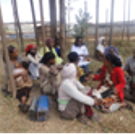Sebeta Town, Ethiopia
Alem Yalew Adela (Ethiopia) and Margie Huang (US/Ethiopia) are working on a Disaster Risk Reduction program and an income generation program with 265 families in Sebeta Town, Ethiopia. Community members suffer from chronic poverty due to lack of sources of income generation and savings/microcredit — and also suffer from reduced crop harvests due to a shortage of rain linked to climate change.
| Woman Voting During Needs Assessment Process |
|
 |
Alem and Margie are working on a project that includes three main programs: |
The DRR program is extremely interesting because unlike focusing on reducing risk to floods, rising sea level, or extreme weather events — it’s focusing on reducing risk such that the community will be prepared for climate change impacts that will adversely impact agricultural production and hence, food security.
Disaster Risk Reduction Program [Solution to underlying cause: Shortage and erratic rains in some parts of the country leads to diminished production and productivity of crops]
[Activity 1]. Community-based workshop with community members to identify their knowledge of risk, vulnerability and traditional coping techniques related to food security
[Activity 2]. Community workshop on evidence-based technologies and/or techniques that will reduce risk, prevent, and prepare them for climate change impacts that might adversely affect the products/services they are hoping to develop
[Activity 3]. Develop demonstration site of the above evidence-based technologies and/or techniques to increase production and productivity (e.g. selection of crops adapted to climate change, proper water utilization, development of drainage during high rainfall season).
Some of the background challenges this project faces are these families have insufficient income to fulfill basic household needs — such as food, clothing, medical costs, and household rent. Food insecurity affects community members health, physical strength and the productivity of the women.
The DRR program is unique in the sense that team Ethiopia intends to hold a participatory workshop with the community members in order to identify their knowledge of risk, vulnerability, and traditional coping techniques related to food security. They will then combine this local knowledge with scientific knowledge in order to present to the community evidence-based techniques that will reduce risk, and prepare them for climate change impacts that might adversely affect the products that they hoping to develop.
One of the main products that they’re hoping to develop are vegetables from urban gardens that local/regional businesses have a demand for. They’re hoping to partner with these businesses to develop vocational training that will help them develop improved agricultural practices for these which are in demand. Their project also includes developing a demonstration site for these evidence-based techniques that can show others in the community how to increase productivity and how to adapt their production techniques to climate change: proper water utilization and the development of drainage during high rainfall.
The long-term impact of the project is for these community members to have sufficient income to fulfill family need, have increased crop harvests that can adapt to a changing climate, for their children to be able to attend school and for the women could be able to have the health and strength to lead the productive, meaningful, prosperous lives they need to leave the vicious cycle of poverty and contribute to the development of their communities.
Download their report and needs assessment:
Needs assessment workshop
Initial project outline
Would you like to learn how to develop Community Based Adaptation Projects?
Please write us with your stories, thoughts and comments through Online.Learning@csd-i.org